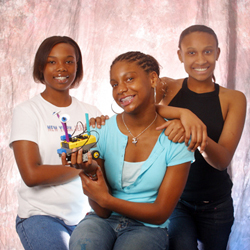Office of Internal Communications
|
June 29, 2004
In 1979, only about 12 percent of women in the United States enrolled in engineering courses. Today, about 20 percent of them enroll in engineering courses and go on to receive their bachelor’s degrees. At the University of Houston, the trend toward more women enrolling in engineering courses has been similar, but according to Stuart Long, associate dean of the Cullen College of Engineering, the numbers have slacked off a bit. “Our numbers have gone down by just a couple of percentage points within the last couple of years, but it is something we are concerned about,” he said. “We want girls to become interested in engineering and hopefully make a career out of it.” However, another factor may cause women to shy away from engineering. According to “The Engineering Income and Salary Survey” by the National Society of Professional Engineers, the salaries between men and women with the same amount of engineering experience vary greatly. Between men and women with 25 years or more work experience, the salary gap, according to the 2004 survey, was $12,600. For men and women with 10 to 14 years work experience, the gap was only $2,500. The survey included salaries, fees, cash bonuses commissions and profits. Despite the differences in salary, UH is trying to boost women’s interest in engineering. UH created GRADE (Girls Reaching And Demonstrating Excellence) camp, a weeklong day camp designed for girls entering ninth through 12th grade. This year, GRADE camp was held four weeks in June — two more weeks than last year — which Long credits to its growing popularity with students and their parents. “I’ve become interested in engineering within the last couple of months, and my grandmother learned about GRADE camp, so she signed me up,” said Kathryn Douglass, who came from Colorado to attend the camp. “This camp is a good way to see if I am any good at engineering, which will help me decide where I want to go to college and what I want to get my degree in.” From presentations by established women engineers to lessons in control systems, the camp offers young women a glimpse into possible future careers in engineering. During the week, students participate in activities, attend mini engineering courses and talk with female UH faculty members and students and female engineers within the community. On Fridays, parents, high school teachers and other guests are invited to the camp for a special luncheon and a presentation of what the girls have accomplished. “Each week, the girls are assigned the task of building a robot that can find its way through a maze without a remote or other device,” Long said. “This project is not easy, but the girls are eager to learn from this experience.” The students are paired with a mentor from the Society of Women Engineers who works with them throughout the building phase of the project. The teams wrap up their projects on Thursday evenings and celebrate with a pizza party hosted by GRADE camp volunteers. The girls achieve a great sense of accomplishment at week’s end, Long said, but it is the parents who are most impressed. “The look on the parents faces when they see what their child has done is truly amazing,” he said. “They can’t believe their children are doing work like this.” With GRADE camp’s increasing popularity, Long said he hopes more women will seek engineering degrees. From civil, nuclear, computer and materials engineering to mechanical, agricultural, aeronautical and industrial engineering, there are a host of career options available for women engineers. At UH, Long noted that many women enrolled in the college choose careers in health care. “We need to get the word out earlier in life,” he said. “The earlier they learn about careers in engineering, the sooner they can prepare by taking higher-level math and science courses.” Leticia Vasquez
|
||
